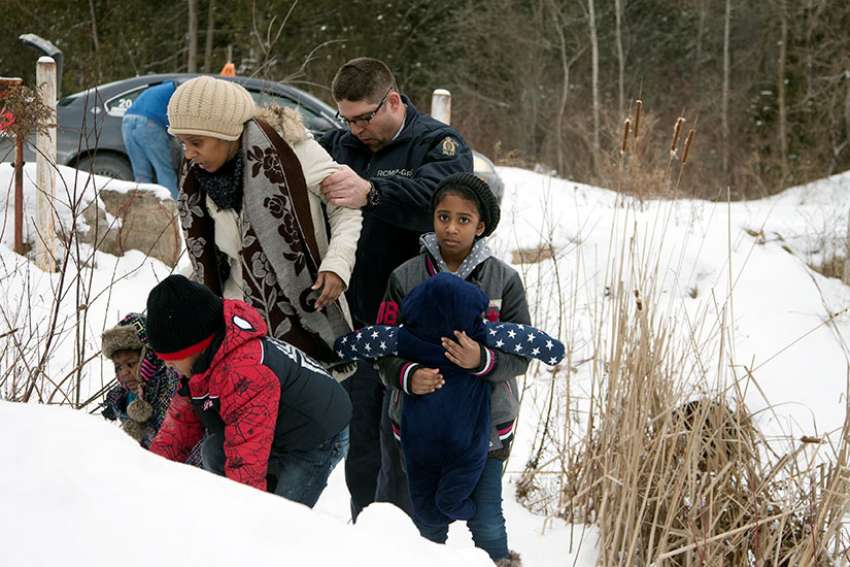However, that doesn’t mean all is well. There are signs it will get worse for asylum seekers.
“What’s happening in the United States, or the direction that it’s heading, is very troubling,” said Donald M. Kerwin Jr., executive director of the Scalabrini-sponsored public policy think tank. “I can certainly understand why people would, based on these executive orders and the poisonous rhetoric by U.S. President Donald Trump and his administration, head to Canada and think they can’t get a fair hearing in the United States.”
The Canadian Council of Churches, Amnesty International, the Canadian Council for Refugees and the Canadian Civil Liberties Association have all called on Ottawa to suspend the 2004 agreement with the U.S.
The agreement stipulates that if a person in the United States arrives at a land border crossing and asks for asylum, Canada will not examine their case and will turn the person back to apply for asylum in the U.S.
Applicants already inside Canada who ask for asylum are covered by the 1951 United Nations Refugee Convention. They must be referred for an impartial hearing to determine whether or not they are refugees.
Under the 66-year-old international law, refugees must not be sent back to face persecution, danger or death in their country of origin.
The problem refugees face in the U.S. isn’t so much the immigration court system as enforcement officers who deny people an opportunity to apply for asylum, said Kerwin.
“The thing that is most frightening to me, I think, is the expansion of the expedited removal process,” said Kerwin.
He charged that both U.S. border guards and inland immigration officers routinely misrepresent the legal rights and due process available to asylum seekers in the U.S.
“They lie through their teeth,” Kerwin said. “They’re essentially in the position when they encounter these people (legitimate refugee applicants) to act as the judge, the prosecutor, the jury and the police — and nobody ever knows that people are being fast-track-returned without any recourse.”
Washington’s recent commitment to hire 15,000 more enforcement officers can only make things worse, in Kerwin’s eyes. Homeland Security has a poor track record of hiring and appropriately training immigration enforcement officers, he said.
“Oftentimes they will find retrospectively that they have hired people with criminal records, even members of cartels — cartel plants,” said Kerwin.
The moral imperative to protect and shelter refugees has never been more acute, Kerwin said. “It couldn’t be a more important issue right now from the perspective of Catholic teaching and what the Pope has been saying.”
He added: “I still think there are many aspects of the U.S. asylum system that are robust and fair. It might be headed in that (negative) direction, but I’m not convinced that it’s there yet. I’m not sure, for example, that the Canadian asylum system is perfect either. Our research has shown that there’s a lot of bias among (Canadian) judges.”
Over 800 law students from 22 universities across Canada conducted a legal research-a-thon in February and issued a March 12 report that argues Canada’s continued participation in the Safe Third Country agreement violates Canada’s Charter of Rights and Freedoms.
“We shouldn’t be waiting for somebody’s body to be washed up before we suspend the Safe Third Country agreement,” Canadian Council for Refugees executive director Janet Dench told The Catholic Register. “It creates this incentive and need for people to cross (the border) irregularly. As we’re seeing, that is also risking people’s lives.”
The Canadian Council for Refugees doesn’t base its call to suspend the agreement on changes since Trump took office.
“The U.S. was not safe (for refugees) previously,” said Dench. “So we have argued in the courts and in fact won in the courts. The Federal Court agreed with us (in 2008) that the U.S. was not safe for refugees. It was overturned on a different ground at the Federal Court of Appeal. The substantive review was never overturned.”
Canadians who insist on calling in-country refugee applicants “queue jumpers” haven’t really thought through their country’s moral and legal obligations, said Dench.
“If we’re portraying refugees who come amongst us as bad refugees and the ones we select as the good ones, that’s a way of making ourselves feel good about ourselves without actually meeting the challenges, the moral and legal challenges, that are before us,” she said.
Whether they make their claim in Canada or overseas, refugees have come to rely on churches to stand by them, said Dench.


